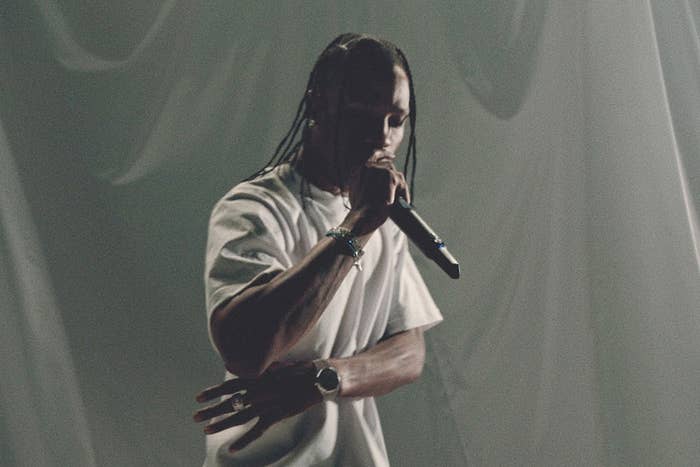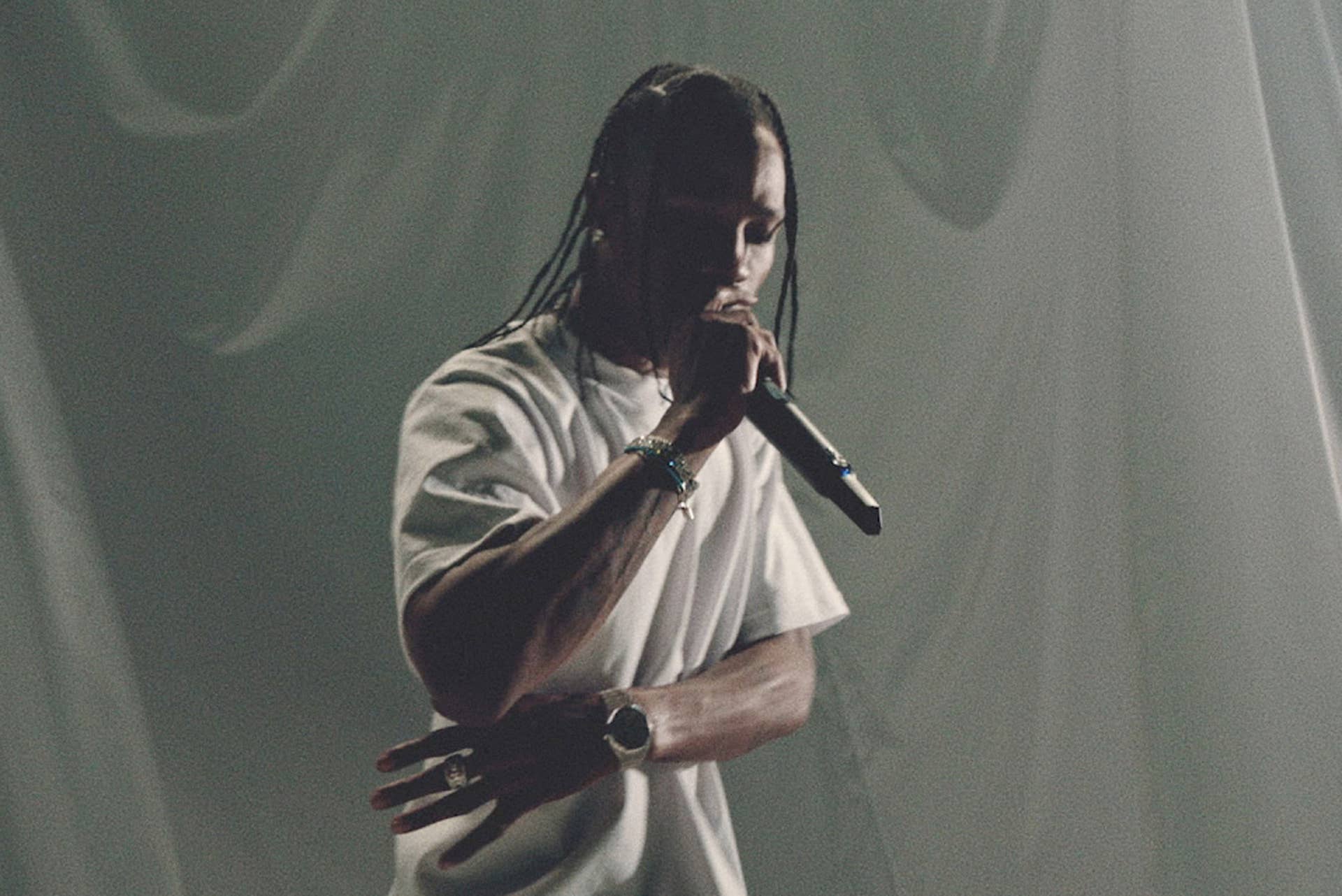
Travis Scott is a top-tier recording artist, but music isn’t what defined his year.
In 2020, he’s released a few successful singles, but for many people, “The Scotts,” “The Plan," and “Franchise” don’t rank high in his all-time singles canon. Despite the musical output, though, many fans would say Travis Scott was one of the biggest winners of 2020. Why? Because he’s reportedly accrued $100 million in corporate partnership deals.
Travis’ fans have come out in droves to support whatever he does. He’s ridden their devotion to millions of dollars in brand deals with the likes of McDonald’s, Sony, Nike, and Fortnite. Even his music rollouts have benefited from marketing and merch ploys that surpass the average release. He partnered with TNT and the NBA to premiere “The Plan,” a single from the soundtrack of Tenet, during an NBA playoff game. According to Billboard, “The Scotts” got help from "15 physical configurations” of physical sales to reach the top of the charts, while “Franchise” was buoyed by 58,000 CD and cassette sales. Of those 58,000 units, how many of the owners even have a CD or tape player? Function didn’t matter to them; it’s all about buying into the brand for his fans.
Travis is a master of aestheticism. Since his mainstream arrival in 2013, he’s carefully cultivated the kind of mysterious-yet-stylish image that transfixes youth culture, and now he’s cashing in on it. It’s what made Forbes deem him “the brand whisperer.”
The ways in which people have reacted to his deals provide a fascinating glimpse at just how split rap fans still are with their relationship to capitalism. Many onlookers rave about his ventures, expressing more glee than they did about his music this year. Others have no love for his brand partnerships because they’re occurring amid heightened class consciousness and awareness of the manner in which celebrity consumerism upholds economic inequality. There was a time when an artist who so fervently branded themselves would be called “a sellout.” But once rap figures like Jay-Z, Diddy, and Russell Simmons let corporate America buy into rap by the billions, that was no longer a predominant narrative. For better or worse, Travis Scott is poised to be the next mogul up.
He’s achieved his growing fortune by paralleling Kanye’s legendary curatory ability, but sanding off some of the outspokenness that scared brands away from ’Ye. Travis’ image is much more polished than his music would indicate. Travis rarely gives in-depth interviews or divulges personal opinions on social media, and his silence makes him the ideal partner for brands looking to tap into youth culture and Black culture (sometimes while distracting from their questionable ethics). He’s recently expressed his willingness to “tap in” with public officials and be a tool for politicians in his native Houston, reflecting a desire to affect political change. But it’s also true that his ascendance into wealth benefits not just his pockets, but an inequitable system.
On November 30, Travis Scott announced a collaboration with Swedish luxury fragrance house BYREDO on a limited-edition run of colognes and candles. The Space Rage cologne went for $295, while the candle was $95. Some people scoffed at the line’s mysterious scent notes, such as “Antimatter Particle,” “The Scent of Supernova,” and “Dark Nebulae.” But apparently, plenty of people wanted to smell like “Atmospheric Vapour,” because the line sold out in one day. It was just the latest deal in a long line of partnerships.
On December 30 of last year, Forgiato announced that they were selling 24” Travis Scott rims. In April, he made an estimated $20 million from an online Fortnite concert. He earned another estimated $20 million when he collaborated with McDonald’s on a Cactus Jack meal (a Quarter Pounder with cheese, bacon, and lettuce, a Sprite, and fries with BBQ sauce), and also sold a line of clothes, McNugget body pillows, and a Cactus Jack action figure to boot. He’s so influential that he’s got his fans clamoring to wear the golden arches. For weeks, teenagers and young adults posted clips of themselves going into McDonald’s and telling the clerks, “Cactus Jack sent me.”
Sony decided to reel his lucrativity in-house by making him their new Strategic Creative Partner in November. They also announced his PlayStation x Nike Dunk Low Collab. As his Gucci Mane and Jeezy Verzuz merch demonstrated, he doesn’t even have to be involved in a moment to try to make a dollar from it.
Travis may have learned from his proximity to the Kardashian bubble. With Kris Jenner at the helm, the reality starlets have accrued their fortune through branding everything from cosmetics to fashion. Kylie Jenner made a fortune from Kylie Cosmetics. It’s no surprise that their hustle rubbed off on some of the men in their lives. Kanye West went from declaring he was $53 million debt in 2016 to being a multi-billionaire through his Yeezy Line. And now, Travis Scott is a safe bet for hip-hop’s next billionaire.
He has young consumers eating out of his palms right now. Many rap fans and Twitter armchair Forbes correspondents extol the wisdom of his corporate collabs. He’s definitely making a lot of money, but he’s doing it during a time when so many other fans are becoming critical about the space celebrities hold as emissaries of capitalism. Consumerism is tied to capitalism, which is tied to systemic oppression, but some of the same people under the thumb of this system are raving about his Ws.
Of course, the flaws of the system aren’t Travis’ fault alone. Ascending the capitalist ladder in this era, though, means inevitably partnering with unethical brands seeking to use your presence as damage control. That’s been the case for Travis. In 2019, he helped the NFL ingratiate themselves to Black America by performing at the Super Bowl LIII halftime while Colin Kaepernick is still blackballed. He gave Fortnite good credit with hip-hop fans two years after 2 Milly sued them for stealing the Milly Rock dance. And as Vice reported, his McDonald’s deal came after racial discrimination lawsuits filed by Black former employees of the fast food giant. When brands can find someone to help distract society from their flaws, there’s no consideration of correcting the flaws.
Jay-Z was castigated for siding with the NFL over Kaepernick last year. Beyoncé’s Ivy Park venture has faced criticism for hiring “Blackfishers” as models and using sweatshops which paid laborers 54 cents an hour. Kanye caught shit this year for applying for, and receiving, a multimillion-dollar PPP loan as a billionaire. But Travis, so far, has managed to slip through the cracks of major criticism.
He’s so effective as a “brand whisperer” in part because he’s positioned himself as a blank slate. Most artists build fan loyalty through a harrowing backstory, or an over-the-top personality, but we don’t know much about Travis. Perhaps that circumstance is attributable to him beginning his career as a producer. He, more than any other artist, has carried the Kanye West torch as hip-hop’s ultimate aesthetician. Travis found himself in Kanye’s orbit at the start of his career, and that curatory approach rubbed off on him. His Astroworld album had dozens of writers and composers, but he put it all together and crafted a landmark album.
Travis parallels Kanye’s musical vision, but he doesn’t blurt out unforgettable ego-isms in interviews or on social media. He’s never been intent about his lyrics being a predominant factor in his music, because the “vibes” are the draw. His AutoTune’d crooning melds into his monstrous soundscapes so slickly that his vocals often fall to the background. He’s one of the biggest artists ever to prioritize evocation over messaging.
On the contrary to accessible stars like Cardi B and Lil Uzi Vert, his social presence is as sanitized as the brands he collaborates with. After his controversial Hot 97 assertion that the late Mike Brown “probably deserved consequences,” he’s been careful about which media outlets he appears on, and what he says in interviews. In a time when fans mull the dynamics of separating the art from the artist, Travis is so nestled in layered production and corporate curation that there’s not much of him to scrutinize. He’s transcended personability like an ‘80s pop star. To millions of teens, he’s not Jacques Berman Webster II the man; he’s incredible music, magazine covers, and merch. He’s become iconography, which allowed him to make boatloads of money without even showing his face for his Fortnite or McDonald’s ventures, being represented by a virtual avatar and an action figure, respectively. Fans didn’t need him to tap in, they merely needed his spectre.
Mainstream rap and corporate America are entangled in a nearly symbiotic relationship. The five elements of hip-hop are rapping, DJing, breakdancing, graffiti, and beatboxing. But for many people, there’s always been an unofficial sixth element: the hustle. Travis Scott is getting his money in droves. Even while fans are waiting for his music to uptick back to his Astroworld-era peak, they’re celebrating his hustle.
For onlookers, rooting for Travis isn’t about him as much as it is celebrating the idea of Black artists making money in a racist industry. For consumers, patronizing him is as simple as having proximity to cool via Cactus Jack iconography. His stardom is something that his fans have collectively made in order to have something bigger than themselves to tap into. Those are age-old, understandable concepts. But times are changing. And no one should be exempt from criticism for so mightily benefitting a system of capitalism that’s exposed as inarguably harmful after a little reading. Capitalism persists on corporate exploitation of low-wage workers, as well as the sustenance of harmful power dynamics like racism, LGBTQphobia, and misogyny. Wealth-hoarding is directly linked to poverty and homelessness. So while many celebrate Travis’ deals, others feel like the fortune of a few isn’t worth the suffering of many more.

